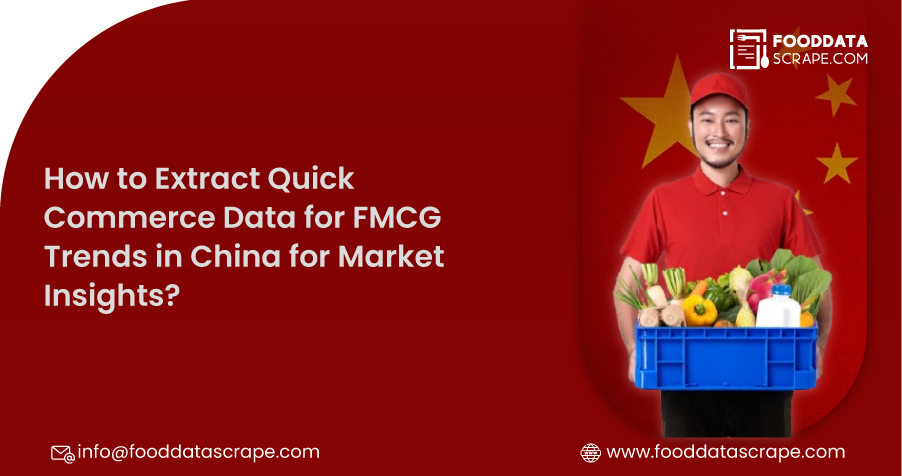Introduction
The FMCG sector in China is changing at the speed of lightning. It is moving fast due to technological advancements, changes in consumer preferences, and quick commerce. Extract FMCG Data for Quick Commerce in China to gain detailed insights into the rising demand. Q- commerce refers to the ultra-fast delivery of groceries, personal care, beverages, and household essentials within minutes or hours. Platforms such as JD Daojia, Ele.me, Meituan, and Pinduoduo are at the helm of this revolution that strives to meet the escalating demand for instant convenience in China.
Knowing the evolving market trends, consumer behavior and competitive dynamics in China's FMCG industry is fundamental. Quick Commerce Data Scraping for FMCG Trends in China is essential for businesses, investors, and analysts to identify information to help them make informed decisions in this rapidly evolving industry. With the support of Web Scraping Quick Commerce Data, real-time trends on pricing, product availability, consumer sentiment, and emerging brand preferences--the holy grails of what makes up China's FMCG landscape--come to light.
The Growth of Quick Commerce in China's FMCG Sector
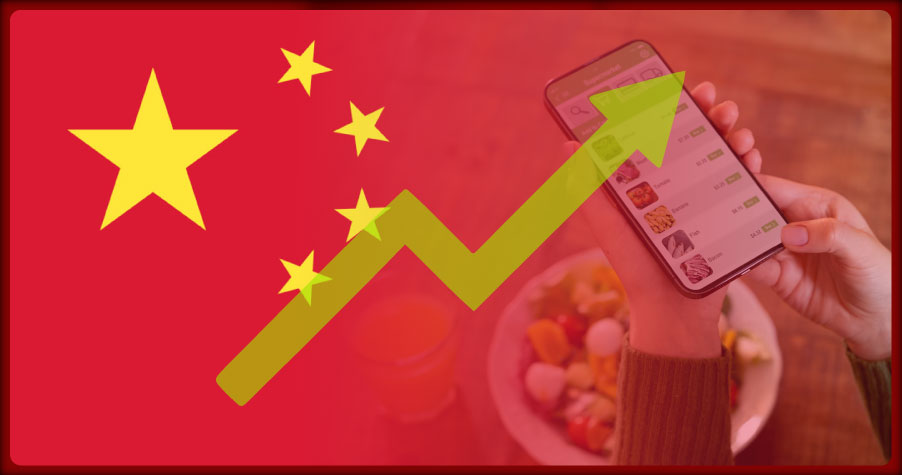
China's rapidly growing digital economy has paved the way for quick commerce. The rise in smartphone penetration, the integration of seamless payments, and AI-powered logistics enable companies to offer instant delivery services. FMCG Market Trends Data Scraping for China helps businesses analyze this emerging sector, which gives an insight into consumer preferences and changes in market trends. Ultra-fast delivery of groceries, personal care items, and household essentials continues to pick up pace. By leveraging China Quick Commerce Data Extraction for the FMCG Market, businesses can track product availability, pricing trends, and emerging brands, enabling data-driven strategies to stay ahead in China's fast-paced FMCG industry.
Leverage the Benefits of Quick Commerce Data Scraping with Food Data Scrape
Key Drivers of Quick Commerce Growth
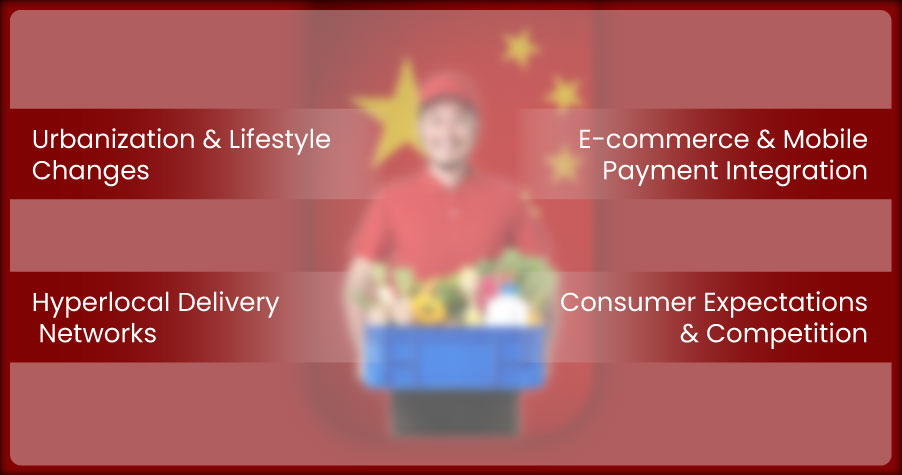
Evolving consumer expectations, urbanization, technological advancements, and seamless digital payment integration drive the rapid growth of quick commerce. Efficient last-mile logistics, AI-powered supply chains, and intense market competition further accelerate the expansion of ultra-fast delivery services across various industries.
- Urbanization & Lifestyle Changes As more consumers migrate to high-density urban areas, the need for convenience and efficiency has surged. Modern lifestyles, especially among busy professionals and younger generations, have increased the reliance on rapid delivery services for daily necessities. Businesses looking to Extract Quick Commerce FMCG Trends in China can analyze purchasing patterns and delivery preferences to optimize their services and meet evolving consumer demands.
- E-commerce & Mobile Payment Integration The widespread adoption of digital payment platforms like Alipay and WeChat Pay has revolutionized the online shopping experience. These seamless payment solutions eliminate transaction friction, making it easier for consumers to shop online. Web Scraping Grocery Delivery Data can help businesses monitor how integrated payment solutions impact consumer behavior and transaction frequencies across leading Q-commerce platforms.
- Hyperlocal Delivery Networks The rapid expansion of last-mile delivery systems, powered by AI-driven logistics and automated warehouses, ensures that FMCG products are delivered faster than ever. Companies utilizing Grocery Delivery Scraping API Services can gain real-time insights into hyperlocal fulfillment efficiency, delivery speed, and inventory management, allowing them to refine their operations for better customer satisfaction.
- Consumer Expectations & Competition The rising demand for instant gratification has intensified competition among retailers and quick commerce platforms. To stay ahead, companies now offer personalized promotions, AI-driven recommendations, and ultra- fast deliveries. Businesses leveraging a Grocery Price Dashboard can track dynamic pricing strategies, promotional trends, and competitor insights, enabling them to fine- tune their pricing models and marketing strategies for maximum profitability.
Importance of Scraping Quick Commerce Data for FMCG Analysis
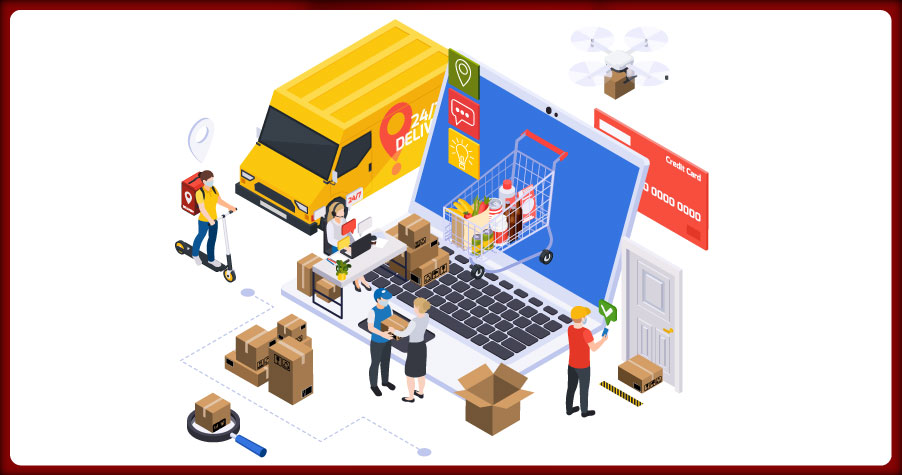
To stay competitive in China's evolving market, businesses must harness the power of real-time data. Scraping Quick Commerce data for FMCG trends in China provides many insights that drive strategic decisions.
- Market Trend Analysis: Scraping FMCG data helps brands track product demand patterns, seasonal purchasing behaviors, and emerging categories. Analysts can identify rising trends in health-conscious products, sustainable packaging, or premium FMCG offerings.
- Pricing Intelligence & Competitive Benchmarking: Dynamic pricing strategies are essential in China's highly competitive FMCG market. Companies can compare price fluctuations, discount strategies, and promotional campaigns by extracting pricing data from multiple quick commerce platforms.
- Consumer Behavior Insights: Understanding consumer preferences is critical for brand positioning. Web scraping allows businesses to analyze search queries, product reviews, and purchase frequency, helping them refine marketing strategies and optimize product placement.
- Supply Chain & Inventory Monitoring: Quick commerce relies on real-time stock availability, so scraping inventory data from Q-commerce platforms can reveal supply chain gaps, delivery bottlenecks, and optimal restocking cycles.
- New Product Launch Tracking: Brands and investors can monitor the introduction of new products across different platforms, assessing how consumers react to fresh FMCG offerings and predicting future demand trends.
Key FMCG Categories Benefiting from Quick Commerce Data Scraping
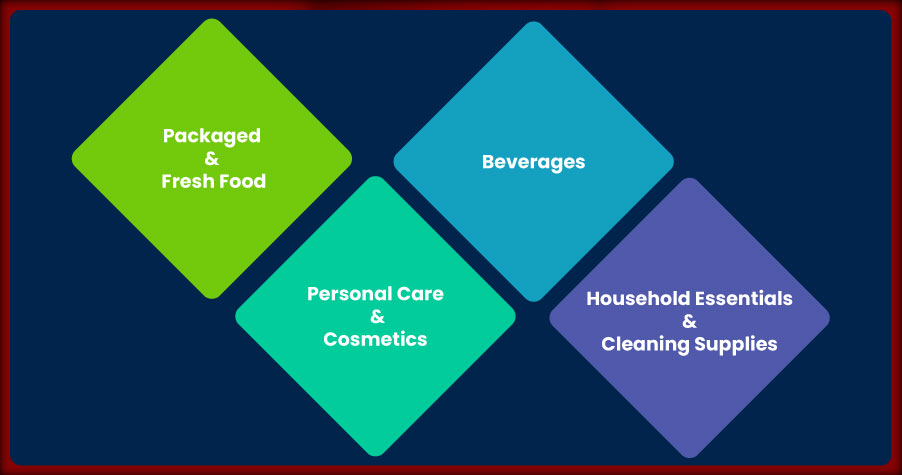
Several FMCG categories are experiencing heightened demand in China's quick commerce ecosystem. Scraping data from these segments enables businesses to refine strategies and optimize sales.
- Packaged & Fresh Food: From ready-to-eat meals to fresh produce, quick commerce is redefining grocery shopping. Scraping data on food availability, pricing, and best-selling items helps companies identify in-demand products and tailor their offerings accordingly.
- Beverages: The increasing demand for instant coffee, energy drinks, and functional beverages has made beverage brands keen on tracking consumer preferences. Data extraction reveals which flavors, packaging formats, and brands dominate the market.
- Personal Care & Cosmetics: With China's beauty and skincare market expanding rapidly, scraping data on product listings, pricing variations, and user reviews can help brands gauge market sentiment and adjust their product positioning.
- Household Essentials & Cleaning Supplies: Consumer reliance on quick commerce for household goods is growing. Tracking data on best-selling cleaning supplies, paper products, and detergents helps businesses anticipate stock shortages and plan production accordingly.
Challenges in Scraping Quick Commerce Data in China
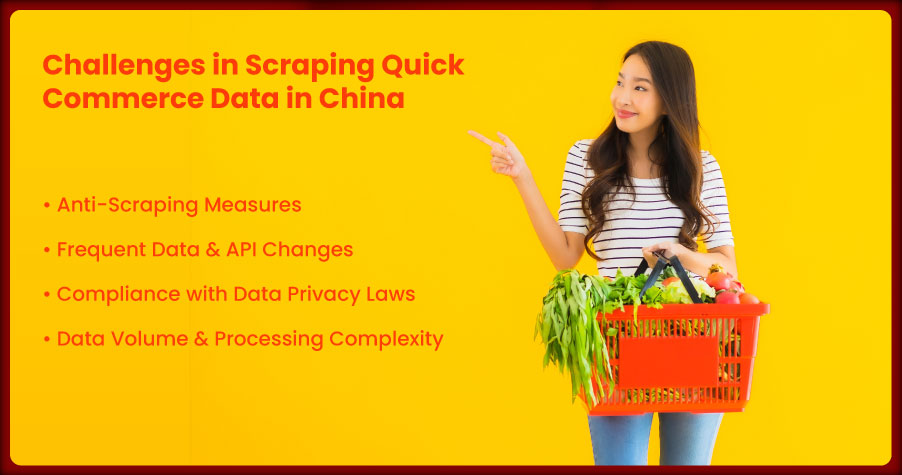
While scraping quick commerce data offers numerous advantages, it also comes with technical and regulatory challenges.
- Anti-Scraping Measures: Many platforms employ sophisticated anti-bot mechanisms, including CAPTCHAs, rate limiting, and IP blocking, making data extraction more challenging.
- Frequent Data & API Changes: Quick commerce platforms often update their APIs and website structures, requiring scrapers to adapt to maintain data accuracy continuously.
- Compliance with Data Privacy Laws: China's Personal Information Protection Law (PIPL) and other data regulations impose strict rules on data collection. Businesses must ensure ethical scraping practices to avoid legal repercussions.
- Data Volume & Processing Complexity: With millions of daily transactions, handling large volumes of scraped data requires robust storage, processing, and analytical capabilities.
Future of Quick Commerce Data Analytics in China's FMCG Market

The future of China's FMCG industry will be shaped by integrating AI, big data analytics, and machine learning in quick commerce operations. Scraping and analyzing Q-commerce data will enable businesses to:
- Predict Consumer Demand AI-driven predictive models will refine inventory forecasting and minimize stockouts.
- Enhance Personalization Brands will deliver hyper-personalized product recommendations based on real-time consumer data.
- Optimize Pricing Strategies Data-driven pricing models will allow companies to set competitive prices based on demand fluctuations and competitor strategies.
- Improve Supply Chain Resilience Real-time data insights will enhance supply chain agility, reducing inefficiencies in last-mile delivery.
Conclusion
China's quick commerce revolution is transforming the FMCG sector, offering unparalleled convenience to consumers. Businesses can gain deep insights into market trends, pricing strategies, consumer preferences, and supply chain efficiencies by leveraging web scraping to extract valuable data from Q-commerce platforms. Companies can monitor real-time price fluctuations and optimize their competitive positioning by utilizing a Grocery Price Tracking Dashboard. Additionally, Grocery Pricing Data Intelligence enables brands and retailers to analyze pricing patterns, forecast demand, and refine their promotional strategies. However, navigating technical challenges and regulatory frameworks is essential for ethical and practical data collection. As China's digital commerce landscape evolves, the ability to harness quick commerce data will be a key competitive advantage for FMCG brands, retailers, and investors seeking to thrive in this dynamic market.
Are you in need of high-class scraping services? Food Data Scrape should be your first point of call. We are undoubtedly the best in Food Data Aggregator and Mobile Grocery App Scraping service and we render impeccable data insights and analytics for strategic decision-making. With a legacy of excellence as our backbone, we help companies become data-driven, fueling their development. Please take advantage of our tailored solutions that will add value to your business. Contact us today to unlock the value of your data.






















































































